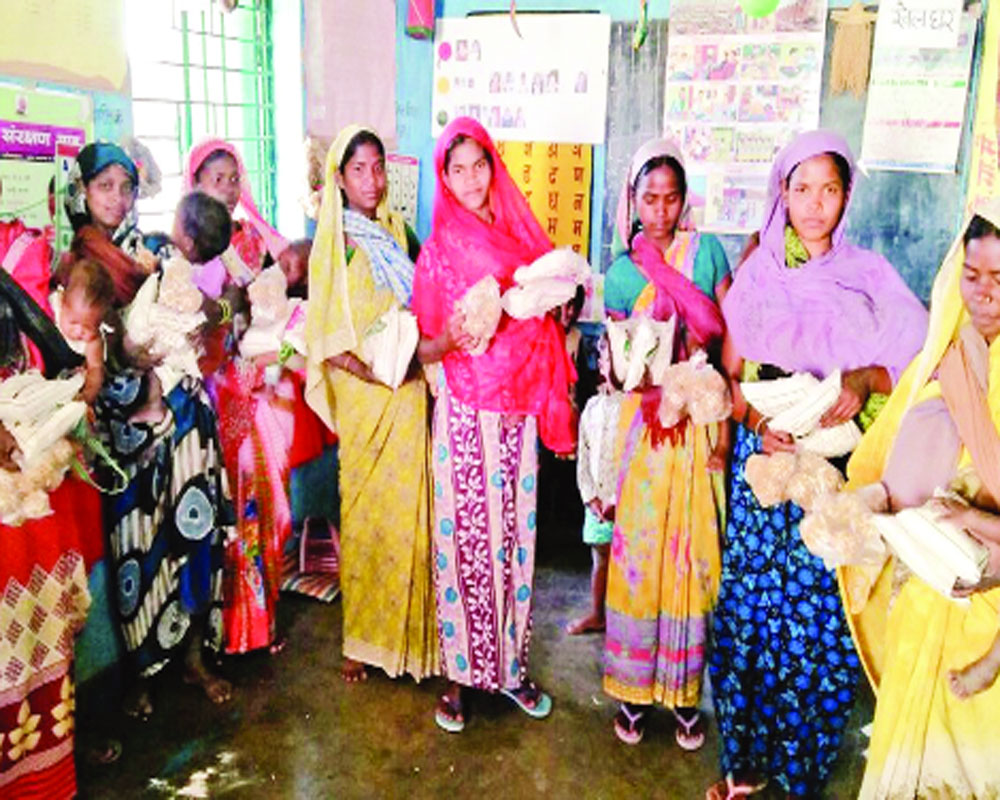A government scheme for holistic nourishment, which works for nutrition counselling, initiates a dialogue on women’s menstrual hygiene, breastfeeding, immunisation and anaemia in Bhiwandi. By Irin Chatterjee
Six-month-old Chotu was lying comfortably ensconced in his mother’s lap. He was dressed in bright clothes and his eyes were lined with kohl. His mother’s eyes sparkled with sheer joy and love as she started talking about all that she had learnt over the 10 days of Poshan Pakhwada celebrations in Bhiwandi, an overcrowded, largely impoverished loom town, a mere 20 kilometres outside of Mumbai, in Thane district. Chotu’s mother was one of the many women who attended the activities organised as part of the fortnight long string of events with a firm resolve: to do her best for the good health and well-being of her child. She was also eager to know how to take care of herself so she could enjoy a healthy and happy motherhood.
Poshan Pakhwada, a nationwide awareness and outreach campaign to mark the first anniversary of Poshan Abhiyaan, the government’s overarching scheme for holistic nourishment took place between March 8 and 22, and included events that ranged from nutrition counselling; talks on hygiene, exclusive breastfeeding and immunisation; anaemia screening for pregnant women; among others, in a bid to ensure adequate nutrition for pregnant women, mothers and children.
Providing sustained and quality healthcare services on the ground is essential in a place like Bhiwandi. Stepping into this town, one simply can’t miss the shanties, with their narrow, dingy, airless lanes that double up as an overpass for the drains. The various slums, be it Shanti Nagar, Gayatri Nagar or Fatima Nagar, present a picture of squalor, chaos and destitution. Nothing really seems to be working out for the thousands of workers and their families who toil away on the power looms, but it’s the women and children who bear brunt of crushing poverty that brings on ill-health, illiteracy and crime.
The focussed health drive was indeed a welcome move, as it brought home the message of making available improved anganwadi services, undertaking better monitoring of expectant women and newborns, and, of course, building greater synergy among the different government agencies and frontline health workers for the benefit of the already struggling community, largely comprising loom workers. The sessions organised during the Pakhwada were attended by children, mothers of newborn babies, expectant women as well as adolescent girls.
The activities included innovative, fun games through which adolescent girls were sensitised about good and bad touch. Shuja Ramja, 14, liked the session ‘attending the programme was useful, I got to know a lot, especially about good and bad touch. She feels that this knowledge will help her deal with situations when boys tease her. Now she will not remain quiet. She also feels that the other things that she learnt at the programme about health, nutrition of mothers and babies will equip her with the knowledge that she will need when she gets married and have children. Apart from being taught about these, menstrual hygiene and using sanitary pads, the dire consequences of teenage pregnancy and the importance of a balanced diet were also addressed in the session. The idea was to prep them with information that would hold them in good stead in the future. They were also told about the importance of completing their secondary education and the right age to get married.
In addition to the immensely popular adolescent awareness programme, there were interactive talks held with women to bring them up-to-date with the different facets of mother and child care. Issues like immunisation, regular weight checks, having a nutritious diet, feeding of colostrum, exclusive breastfeeding and supplementary meals once the baby is six months old were keenly discussed. The session on the importance of maintaining a three-year gap between two children, the need for institutional delivery, the ambulance call number were also well received.
What was of particular interest to everyone attending the event was the information sharing on the various socio-economic government schemes that are available to the community. The reality is that despite a plethora of state and centre-run programmes to boost the nutritional status of children (zero to six years age), pregnant women and lactating mothers, there is a distinct lack of coordination in linking the schemes and making them easily accessible to the people. Consequently, the state of health of women and children in the country is far from perfect.
A total crowd-pleaser was the cooking demonstration undertaken by the anganwadi workers. The idea was to motivate women to use their ‘Take Home Ration’ by teaching them easy recipes. ‘Take Home Rations’ are roast-dried, packaged, ready-to-cook meals that are typically made of wheat, sugar and soybean, fortified with specified quantities of micronutrients. Due to a lack of awareness about preparing meals out of the ‘Take Home Ration’ ingredients, more often than not, the women would simply take them and either throw them away or have them straight from the packet without cooking. The anganwadi workers, aware of this situation, took it on themselves to show them the different delectable treats that can be whipped up with the free ration supply. Delicious sweetmeats like ladoos and halwa, along with crisp hot paranthas (leavened Indian bread) were prepared and distributed during this session much to the delight of the women in attendance. In the end, the purpose of the demonstrations was fulfilled — the women were convinced that, when used in the right way, ‘Take Home Rations’ can not only taste great, more importantly, they are beneficial to their health.
—Charkha Features


























